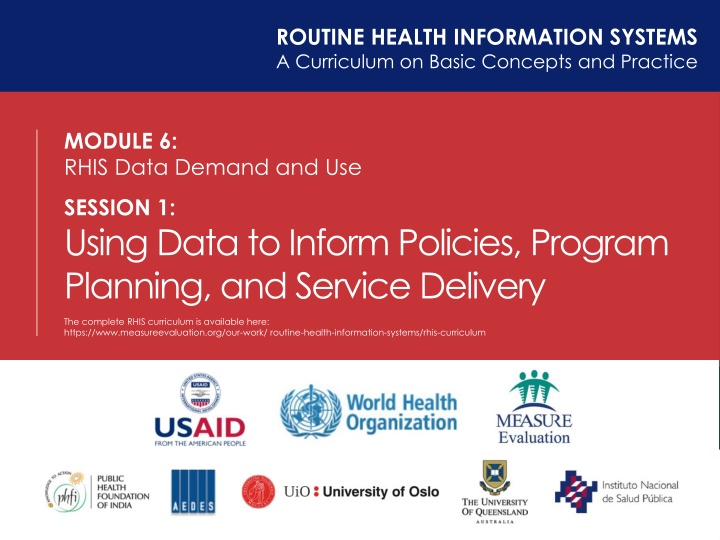
RHIS Data Demand and Use | Enhancing Decision-Making in Health Systems
Explore the value of data-informed decision-making in health systems through the RHIS curriculum. Learn how data can inform policies, program planning, and service delivery, leading to better health outcomes. Discover the significance of data demand and use interventions in strengthening health information systems for improved decision-making processes.
Download Presentation

Please find below an Image/Link to download the presentation.
The content on the website is provided AS IS for your information and personal use only. It may not be sold, licensed, or shared on other websites without obtaining consent from the author. If you encounter any issues during the download, it is possible that the publisher has removed the file from their server.
You are allowed to download the files provided on this website for personal or commercial use, subject to the condition that they are used lawfully. All files are the property of their respective owners.
The content on the website is provided AS IS for your information and personal use only. It may not be sold, licensed, or shared on other websites without obtaining consent from the author.
E N D
Presentation Transcript
ROUTINE HEALTH INFORMATION SYSTEMS A Curriculum on Basic Concepts and Practice MODULE 6: RHIS Data Demand and Use SESSION 1: Using Data to Inform Policies, Program Planning, and Service Delivery The complete RHIS curriculum is available here: https://www.measureevaluation.org/our-work/ routine-health-information-systems/rhis-curriculum
Session 1: Learning Objectives Raise awareness of the importance of using data to inform program planning, policy development, and service delivery Appreciate how data-use interventions can improve a health information system
Overview Value of data-informed decision making Data-informed decision-making process Contextual elements of the decision process Strengthening health systems with information (a theory of change) Data demand and use interventions
Context Pressing need to develop health policies, strategies, and interventions
The Value of Data without information, things are done arbitrarily, and one becomes unsure of whether a policy or program will fail or succeed. If we allow our policies to be guided by empirical facts and data, there will be a noticeable change in the impact of what we do. National policymaker, Nigeria
Definition: Data Use Data are used in the decision-making process in the following ways: Create or revise program or strategic plan Develop or revise policy Advocate support for a policy or program Allocate resources Monitor and evaluate a health program/intervention Conduct client management to ensure good- quality delivery of care Review of data should be linked to a specific decision- making process.
Definition: Data Demand Decision makers specify what kind of information they need to inform the decision-making process then seek it out.
Context of Decision Making Agency, Policymaker, Donor, Civil Society, or Service Provider Beneficiaries Data Users Data Producers P P Questions
Context of Decision Making Promotion of Data Sources Access P P Questions Information Flow
Context of Decision Making P P Questions Decisions
Why Consider Decisions? Data overload Focus on information needs: What do you need to know? Ultimate goal is not to gain information but to improve action
Conceptual Theory: Data Use to Strengthen Health Systems Assumptions Commitment exists at the national level to improve the health information system Data use leads to improved health systems Positive experiences in data use lead to demand for more data Data use activities are tailored to context
Role of Data-Use Interventions in Health Systems Data-demand-and- use interventions for individuals and organizations Stronger health-system building blocks: Service delivery Workforce Medical products, vaccines, technology Financing Leadership and governance Data reviewed and used in decision- making process
Data-Demand-and-Use Interventions Outputs Activities Assess and improve DDU context Barriers to data use overcome Identify and engage data users and producers Users and producers regularly review data and programs Improve data quality Quality data available and information formatted for target audience Improve data availability
Data-Demand-and-Use Interventions Outputs Activities Information relevant to decision-making regularly identified Identify information needs for decision making Build capacity in data use core competencies DDU knowledge and skills increased Strengthen organization s data demand and use (DDU) infrastructure DDU procedures and policies operationalized
ROUTINE HEALTH INFORMATION SYSTEMS A Curriculum on Basic Concepts and Practice This presentation was produced with the support of the United States Agency for International Development (USAID) under the terms of MEASURE Evaluation cooperative agreement AID-OAA-L-14-00004. MEASURE Evaluation is implemented by the Carolina Population Center, University of North Carolina at Chapel Hill in partnership with ICF International; John Snow, Inc.; Management Sciences for Health; Palladium; and Tulane University. The views expressed in this presentation do not necessarily reflect the views of USAID or the United States government.
